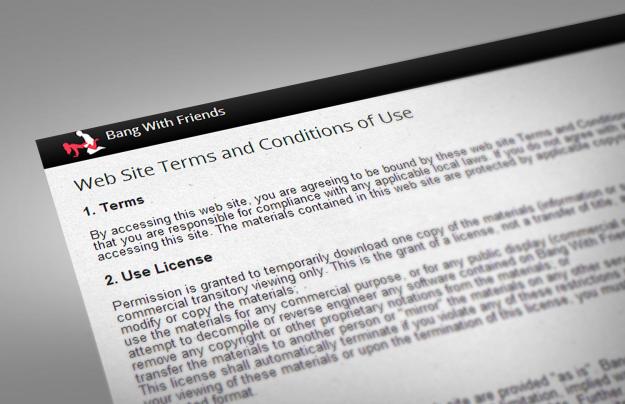
The most amazing thing to me about BangWithFriends, an app that lets you covertly discover which of your Facebook friends wants to bump uglies, is that it took so long to arrive. Launched in February by a group of anonymous founders, BangWithFriends expanded this week from a simple desktop app to a full-on mobile experience, for both Android and iOS. The company claims that around 900,000 people use the app, and about 200,000 users have successfully found hump buddies. With that many people signing up – even if it’s just for a laugh – it’s time we dug into BWF’s terms and privacy policy, just to be safe.
Note: Because BWF is a Facebook app, you are also subject to Facebook’s policies, so keep that in mind.
Terms of service
Turns out, we’re only going to need a garden spade to shovel to the bottom of this document – it’s about as bare bones as it gets. I guess this one will just be a quickie.
Burn notice
The terms kick off with the most basic of licensing provisions: You are downloading a copy of the app, but it’s not really yours to do with what you please. Don’t modify it, or build your own app using the BWF code. And if you do, you automatically lose your right to use the app.
Also, strangely, if you do lose that right, the terms dictate that you “must destroy any downloaded materials in your possession whether in electronic or printed format.” I’m not sure what kind of person is printing out BWF material – but whatever. Them’s the rules.
What you see is what you get
Like every other website, app, or online service, BWF comes “as is,” meaning you should have no expectation that it’s ever going to change or get better (though any successful endeavor usually does).
The more important part here is that BWF “does not warrant or make any representations concerning the accuracy, likely results, or reliability of the use of the materials on its Internet web site or otherwise relating to such materials or on any sites linked to this site.” So if it mistakenly informs you that one of your Facebook friends wants to “bang” when he or she has no such desire, well, that’s just too bad.
Shrinking the risk
BWF is not responsible – meaning it can’t be sued – for anything bad that happens as a result of using the app. (And really, I can imagine a million bad scenarios resulting from covertly requesting to “bang” the people on your friends list.) This is called limiting liability, and most terms include this provision. Some states don’t allow companies to limit liability, so if you think you might have a case against BWF, check with a lawyer to see if your state is one of them.
Chain-chain-change
BWF says it can change any of the “material” on its website (and, presumably, its mobile apps) at anytime, without notice. This includes its terms of service and privacy policy – so those of you who are extra careful (I’m guessing that’s roughly 0 percent of you, given that you’re using an app called BangWithFriends) should check the ToS and privacy policy on a regular basis, just in case.
That said, these documents haven’t been updated since December of last year, so there probably won’t be many regular revisions.
Privacy policy
The privacy policy is just as stripped-down as the terms of service – but it’s actually not a bad policy. In fact, I would go so far as to say it’s a good privacy policy, though it does leave something to the imagination.
Collection time
BWF says that it “will collect personal identification information from Users only if they voluntarily submit such information”. What that really means is, it collects some of your Facebook data (name, age, email address, Facebook user ID, relationship status, and who your friends are) when you connect your Facebook profile to the BWF app – the only way you can use BWF. By connecting your Facebook account, you are giving BWF permission to collect this information about you.
Being used
OK, so BWF gets a trove of your personal information. But what does it do with it? Well, not much – certainly less than what Facebook itself does with it. BWF says it will “not sell, trade, or rent Users personal identification information to others.” That’s great. It also says that it will only use your information to allow the app to operate. And at the moment, there aren’t even ads on BWF, so you’re not getting any ad cookies on your computer either (though the BWF website does use cookies for basic functions).
Barely legal
Because the entire premise of BWF is sex, the app rightly limits the age of its users to those over 18 years old. If you are younger than that – Facebook users can be as young as 13 – you can’t use the app. Good.
And that’s about it. Again, understand that these terms, as good as they are, can change at anytime. BWF says it will post revisions at the bottom of the privacy policy page, so be sure to check it regularly in case the company decides to screw up the good privacy policy it currently employs.


